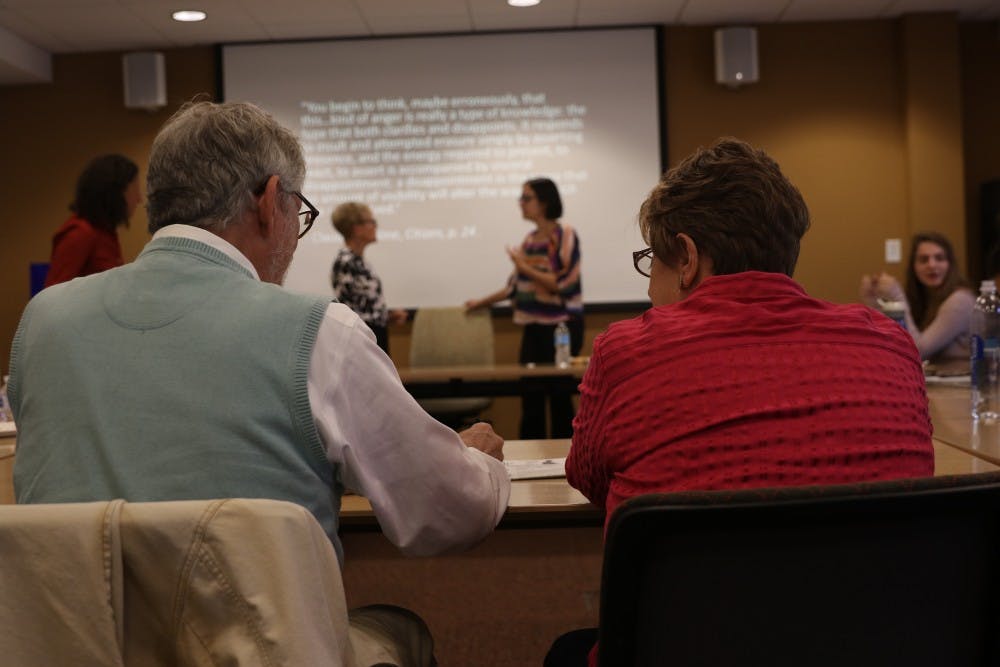Palestinians share an identity, whether they live within Israel or in the Israeli-occupied West Bank territory. What they cannot share—without caution, at least—are Facebook posts.
So said Amahl Bishara, associate professor of anthropology at Tufts University, in a talk Thursday. Her talk, entitled “Posting While Palestinian: Shifting Bounds for Expression in the West Bank and Israel,” was part of a multi-event speaker series commemorating the 50th anniversary of the Israeli military occupation, co-sponsored by the Forum for Scholars and Publics, the Duke University Middle East Studies Center and the John Hope Franklin Humanities Institute.
In her talk, Bishara emphasized how physical barriers—namely, the checkpoints, walls and fences along the 50-year-old “green line” dividing the West Bank from Israel—are not the only obstacles separating Palestinian residents of the West Bank from those of Israel.
“Palestinians in these two areas do not really have one set of media that they share,” Bishara said. “Most media addresses Palestinians in one group or another.”
In other words, Palestinians in the West Bank do not hear the same news as those in Israel.
This is only one of many differences in their realities. Palestinians in Israel are citizens, while those in the West Bank are under military occupation. As a result, West Bank Palestinians do not share the rights to due process, voting and movement that Palestinian citizens of Israel enjoy. Furthermore, Palestinian citizens of Israel can travel to the West Bank, but West Bank Palestinians cannot enter Israel without permits.
The Israeli government is not the sole source of these restrictions either. Its counterpart, the Palestinian Authority, also restricts speech in ways that Bishara said “are hard to keep track of.”
Social media, then, seems like the perfect bridge to the news divide that Palestinians experience. Sure enough, Bishara explained, many Palestinians turn to Facebook not only “to find out which of their relatives and friends were arrested last night,” but also for news of Palestinians on “the other side” that they would not hear otherwise—news that oftentimes consists of videos of Palestinian killings by Israeli soldiers and police officers.
“Rather than watching executions in the public square, Palestinians sit alone or together around smartphones, televisions and computer screens, watching their own people die at the hands of the state,” Bishara said. “We find that online Internet videos are akin to one-day bestsellers.”
Bishara cited several examples of such videos, shot on security cameras or smartphones to eventually go viral on Facebook and other social media platforms. Many have grown to stir social media movements.
For example, 15 years after the shooting of 13 Palestinian protesters in Galilee, Israel in 2000, Palestinians took note that no one had been held responsible for their deaths. In response, several political groups teamed up to organize a social media campaign featuring digital posters of people holding up photos of those killed over their own faces. The posters displayed the slogan “we carry the memory, we continue the struggle.”
However, Bishara noted that Facebook itself limits the content its members can post. She cited this as evidence that social media alone cannot bridge the news divide between Palestinians across the green line.
Additionally, Palestinians on either side of the green line face different consequences for the same brand of social media activism. Palestinians in Israel are at risk of arrest for their posts, with over 400 arrested since October 2015 on the basis of “incitement,” or provoking unlawful behavior.
“The stories and data about arrests for incitement suggest that Palestinians in Israel face harsher penalties for posts on social media,” Bishara said. “How can Palestinians, then, engage in a single counter-public when they cannot comfortably say the same things?”
Get The Chronicle straight to your inbox
Signup for our weekly newsletter. Cancel at any time.

